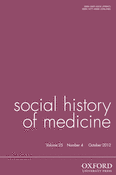-
Views
-
Cite
Cite
Tom Feeney, Church, State and Family: The Advent of Child Guidance Clinics in Independent Ireland, Social History of Medicine, Volume 25, Issue 4, October 2012, Pages 848–862, https://doi.org/10.1093/shm/hks038
Close - Share Icon Share
Abstract
This article considers the advent of psychiatric services for children in independent Ireland through the establishment of the first state-funded child guidance clinic in the mid-1950s. Ireland was somewhat late to embrace the child guidance model which had originated in the USA at the turn of the century, mainly because it challenged traditional notions of child welfare and juvenile justice and provided an alternative to institutional care, the responsibility for which was vested in the Catholic Church. The 1940s witnessed an assertive church response to the health and welfare problems associated with the exigencies of the Second World War through its provision of voluntary social services. This paper argues that the development of child guidance provides an instructive picture of how church and state dovetailed their approach to social service provision during the 1940s and 1950s, and the degree to which social reform often depended on church cooperation and involvement.




